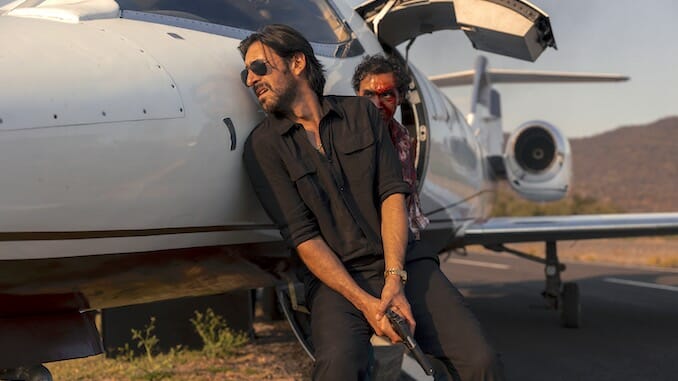Narcos: Mexico‘s Third and Final Season Brutally Proved You Can’t Tame Trafficking
Photo Courtesy of Netflix
The third season of Netflix’s compelling Narcos: Mexico widened its focus and gained a new narrator as it entered a new decade (the 1990s), but the game remained the same. The stories that Narcos and Mexico have told over their combined seasons have familiar ebbs and flows: A dealer or grower has a grand idea to become a distributor or networker, and next thing you know, a new cartel is born. But just as that leader becomes wealthy beyond belief and begins courting politicians, it always signals the beginning of the end. Again and again, from Pablo Escobar and the Cali Cartel in Colombia to Félix Gallardo, Amado Carillo Fuentes, the Arellanos, and El Chapo in Mexico, the cycle of violence is as predictable as it is savage.
The other important half of Narcos, of course, has focused on the DEA and their role in that cycle of drug leaders and territory disputes; once the traffickers begin getting cozy with officials, the Americans start to take note and follow the money. One thing leads to another, violence ensues, and a new kingpin will rise. In Narcos: Mexico, it began with Kiki Camarena’s dogged pursuit of Félix Gallardo, and the latter’s fatal mistake of torturing and killing a federal agent, leading to new American operation to dismantle Félix’s Guadalajara cartel. But as Walt Breslin says to a colleague before one of many failed attempts to capture Benjamin Arellano in this latest season, getting Félix “was bullshit; they gave him up.” And once again, in this final run of episodes, by the time the DEA shows up the play has already been made from the inside.
In the wake of Félix’s end, Narcos: Mexico Season 3 ostensibly focused on Amado Carillo Fuentes, one of the most successful traffickers of all time, and who (according to the final frame of the series), may be the only kingpin to get out alive. But either way, Amado had to get out fairly quickly—it had to end. And this was a man who had a Mexican General in charge of the country’s drug war, one praised by the US government, on his payroll. It still wasn’t enough. The dream that Félix started the series with—of uniting the cartels into a business—was never sustainable. Amado didn’t try to unite anyone under his reign, he just out-maneuvered them and tried to drop as few bodies as possible. Yet his big idea was still related to Félix’s hopes: to sanitize the drug trade as much as possible by (in part) splitting it up into segments to protect himself and his lieutenants, while making connections with high-ranking politicians to clear the way to exceptional wealth and influence. It still didn’t work.
Season 3 had some flashy sequences that showed the drug money being spent by traffickers high and low on the chain, but that’s never really been what the series was about. It’s about those who tried to do something different, to go beyond nightclubs and street fights and build an empire towards legitimacy. That same desire, to tame trafficking, was shared by Benjamin Arellano Félix and his family—he also made friends with politicians and used his drug money to further mutual interests. But violence was always nipping at the heels of this plan in the same way it did for Amado, Félix, and the others. As soon as an upstart (in this case, El Chapo) feels disrespected, it’s not about lawyers and loopholes and lobbyists: the guns come out. Here, that violence escalated until Benjamin’s brother Ramón and his cronies shoot up the Guadalajara airport in broad daylight with not a thought spared for any innocent they mowed down indiscriminately with their gunfire. And that, of course, caught the attention of the Americans, where an increased DEA interest kept the Arellanos on the run while El Chapo and El Mayo filled that void. Once again, the DEA was involved, and was aware, but was also several steps behind while the Mexican government was inert. And even if the Americans or Mexicans did take one crime boss down, even a major figure, there are a host of others waiting in the wings. This “business” can’t be tamed, nor seemingly stopped—gunfire and brutal violence always follow.
Meanwhile, this carousel was being reported on by new characters introduced from the newspaper La Voz, a truth-telling publication that chronicled all of these crossed paths and payouts as best they could before they, too, were victims of extreme threats and violence. And in a storyline that really didn’t connect at all to anything else that was happening (but was nevertheless compelling its own right), we saw the ongoing murders of women who worked in factories around Juarez—a staggering injustice that still has not found an end.